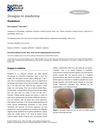 August 2009 in “Expert Review of Dermatology”
August 2009 in “Expert Review of Dermatology” Pregnancy can cause skin changes and conditions that need correct diagnosis and treatment for the health of the mother and baby.
July 2002 in “Journal of cosmetic dermatology” Hair loss can be treated with medications like finasteride and surgical methods like hair transplants.
54 citations,
February 2012 in “Pediatrics in Review” Pediatric systemic lupus erythematosus is a severe autoimmune disease in children requiring early diagnosis and comprehensive management.
 11 citations,
July 2012 in “Current Opinion in Pediatrics”
11 citations,
July 2012 in “Current Opinion in Pediatrics” Skin problems can be signs of hormone-related disorders and recognizing them early is important for treatment.

Continuous research and innovative strategies are essential for sustainable development.

Herbal remedies like liquorice and aloe vera may help manage PCOS symptoms.
 June 2022 in “Foodsci: Indian journal of research in foods and nutrition”
June 2022 in “Foodsci: Indian journal of research in foods and nutrition” Eating better, exercising, staying clean during periods, and learning about health can help reduce menstrual problems and improve life quality.
January 2014 in “Healthy aging research” Polycystic ovarian disease symptoms can continue after menopause, making diagnosis and management in older women challenging.
 January 2013 in “The Pan African medical journal”
January 2013 in “The Pan African medical journal” Monilethrix causes short, fragile hair with no specific treatment available.

The conference emphasized innovative solutions for global challenges, including disaster architecture, education, health, and economic impacts.
 14 citations,
January 2006 in “Skinmed”
14 citations,
January 2006 in “Skinmed” A woman developed white patches on her skin and curly hair after hepatitis C treatment, likely due to the medication interferon alpha.
 10 citations,
July 2022 in “Dermatology and Therapy”
10 citations,
July 2022 in “Dermatology and Therapy” Melasma's causes include genetics, sun exposure, hormones, and oxidative stress, and understanding these can help create better treatments.
August 2018 in “Ayurline: IJ-RIM” Diet and lifestyle changes can help manage hair loss in alopecia.
 May 2021 in “British Small Animal Veterinary Association eBooks”
May 2021 in “British Small Animal Veterinary Association eBooks” If a dog's skin tests are normal but it has hair loss, consider other non-endocrine causes and choose tests based on the hair loss pattern.
 April 2023 in “JAAD international”
April 2023 in “JAAD international” Patients with Frontal fibrosing alopecia in Morocco often have skin conditions and thyroid disorders.
 April 2024 in “Remedium Journal about the Russian market of medicines and medical equipment”
April 2024 in “Remedium Journal about the Russian market of medicines and medical equipment” Pharmacy workers need more education to better help people with hair loss.
 7 citations,
May 1978 in “International Journal of Dermatology”
7 citations,
May 1978 in “International Journal of Dermatology” Recent hair loss research shows some progress, especially in understanding male pattern baldness, but effective treatments for many types of hair loss are still lacking.
January 2022 in “International journal of advanced engineering research and sciences” Hair extensions can improve self-esteem but may cause hair loss if used improperly.
 2 citations,
January 2014 in “Advanced Biomedical Research”
2 citations,
January 2014 in “Advanced Biomedical Research” Oral isotretinoin and cyproterone compound are equally effective for treating acne in women with cutaneous hyperandrogenism.
March 2022 in “International Journal of Trichology” Smoking may worsen hair loss, but more research is needed.
5 citations,
January 2020 in “Research journal of pharmacy and technology” CBD may help reduce stress and pain in women with PCOS.
 2 citations,
October 2020 in “Annals of Oncology”
2 citations,
October 2020 in “Annals of Oncology” Men may be more vulnerable to severe COVID-19 due to genetic and hormonal factors, but more research is needed.
 68 citations,
February 2019 in “Urology”
68 citations,
February 2019 in “Urology” Hormonal treatment in transgender women reduces semen quality, but stopping treatment may improve it.
 10 citations,
September 2001 in “Journal of The American Academy of Dermatology”
10 citations,
September 2001 in “Journal of The American Academy of Dermatology” Hormonal factors may affect female hair loss, needing further research and treatment ideas.
 5 citations,
March 2019 in “Facial Plastic Surgery Clinics of North America”
5 citations,
March 2019 in “Facial Plastic Surgery Clinics of North America” The document concludes that gender-affirming treatments are essential for transgender individuals and outlines safe hormone therapy practices.
 1 citations,
January 2020 in “Journal of quality in health care & economics”
1 citations,
January 2020 in “Journal of quality in health care & economics” Most Sudanese married women in the study used contraceptives and knew about them, but many didn't know about emergency contraceptives or extra benefits beyond family planning.
 August 2010 in “Springer eBooks”
August 2010 in “Springer eBooks” Hormonal contraceptives are effective for teens but require careful consideration of side effects and individual health.
 30 citations,
February 2003 in “Annals of Neurology”
30 citations,
February 2003 in “Annals of Neurology” Progesterone and related compounds may help control seizures linked to the menstrual cycle but have limitations that need addressing.
 30 citations,
March 2001 in “Environmental Health Perspectives”
30 citations,
March 2001 in “Environmental Health Perspectives” Small changes in hormones can significantly impact health, showing the importance of sensitive testing for chemicals that disrupt hormones.
 26 citations,
December 2016 in “Psychiatric Clinics of North America”
26 citations,
December 2016 in “Psychiatric Clinics of North America” Testosterone therapy and surgeries like mastectomy improve transgender men's lives and mental health with low risks and high satisfaction.























